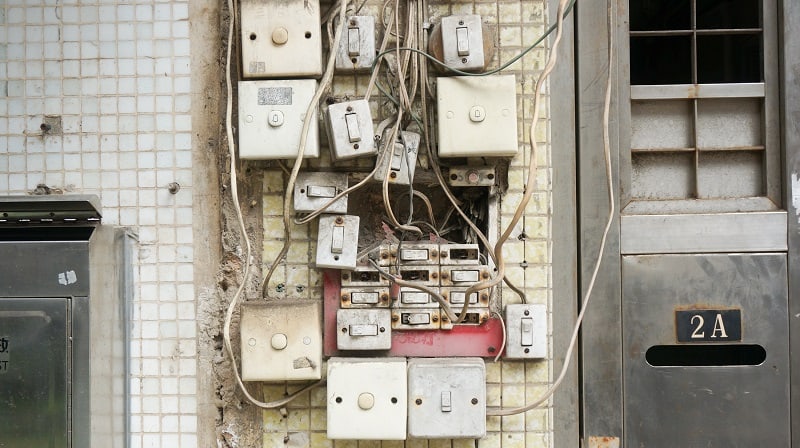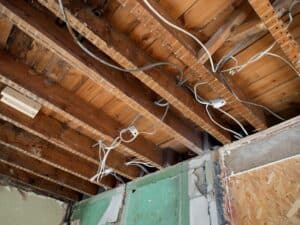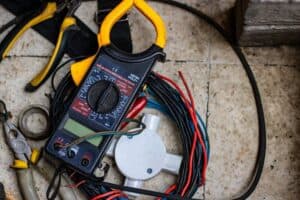Flickering lights, buzzing sounds, shocking electric bills, and old home issues are only some signs you may need to rewire your home.
Its true homeowners dread the word itself, but you will be glad to know that with the right planning and a little patience, it can be one of the easiest projects you ever did.
Read on to learn more or contact us to get on schedule.

Rewiring Your Home: More than Just Changing Wires
When asked to define or describe rewiring, many homeowners won’t go farther than changing the wires. However, rewiring is not just about that. It’s an electrical service that is shaped based on your home or building needs.
Rewiring involves changing an insufficient or faulty system for a new one.
So your rewiring project can easily include upgrading or replacing an undersized/faulty panel.
Undersized panels are not a strange thing. Sometimes it has to do with moving into an old home with an old panel. Other times, it may be that your needs have grown.
Homes built before 1965, often used panels of only 60 amps. Even 100 amps were seen as more than enough. 60-100 amps worked fine because they didn’t have as much appliance or need for electricity as we do now. Modern homes now use up to 200 amps and more depending on the size and appliances in the home.
If your home is as old as the times of 60 amps panels, then chances are you will need to change the wiring and your undersized panel. Such capacity is insufficient and could play out as dangerous for your home.
On the other hand, if your house was wired around 1980 or later, you may only need a few upgrades or changes for damaged fixtures.
You should also ensure everything is up to code.
House rewiring DIY VS Hiring a pro
It’s not a new debate. Homeowners often consider rewiring the home themselves if:
- They are dedicated DIYers
- House rewiring is expensive and DIYing can help save money
- It means letting strangers into various rooms in your home.
- It is disruptive
But unfortunately, this comes with its shortcomings such as:
- Having to do the dirty work of drilling, cutting, wiring, installing, and more.
- Spending more time than an electrician would.
- Lack of experience puts you at risk of shocks, accidents, rewiring wrongly, and failing inspections.
- House rewiring is a complex project.
Fax: (954) 867-7139
Monday - Friday
8 am to 5 pm
Your South Florida Electrician Since 1989
Licensed Electrical Contractor, License: #EC0001331
House Rewire Coupons
The Steps In A Home Rewire

- Familiarize yourself with local electrical codes and permits.
- Prepare your home for rewiring by removing and covering furniture.
- Create a detailed map of the circuits you want to rewire or install, along with sockets, switches, and other electrical features you want.
- Remove old wiring.
- Install new wiring, outlets, and fixtures.
- Test the installations.
- Clean up the home or work site.
- Pass inspection by a licensed electrician
Note that not all electricians will be willing to inspect a DIY job. Still, find one that can confirm your wiring is safe to use.
Rewiring a home yourself can be tougher than you imagine. Some homeowners have a few skills from changing some light bulbs or outlets around the home, but it may not be sufficient for a complex house rewire.
To ensure you can be successful, we have put together some information.
Create your plan
Planning is where it all starts for a home rewiring project. Rewiring gives you the chance to upgrade your electrical system and include things you didn’t have before. So to start you need to identify your needs. If you hire an electrician, this would be where your stress ends. You can simply describe what you want and leave everything else to the pros.
Make a list of the appliances you have and those you would like to add soon. You can think as far as the next 25 years because house rewiring is not a regular project.
Thinking ahead helps save you money, time, and energy in the future.
Here is a list of things to consider or inspire you –
- Home office electronics such as computers and device charging centers
- Entertainment systems, including the TV and stereo system
- Mobility assistive devices such as wheelchair lifts, stairlifts, and assistive chairs
- Larger miscellaneous features such as towel warmers or a motorized treadmill
- Heating, ventilation, and air conditioning (HVAC)
- Lighting and ceiling fans
- Water heater
- Hot tub, spa, sauna, or swimming pool
- Hobby-related electronics such as a guitar amp, power tools, or sewing machine
- Washing machine and dryer
- Kitchen appliances, including the refrigerator, oven, microwave, dishwasher, and deep freezer
After deciding on your needs, draw a map or plan of the house and where these new appliances will be. Double-check this with your electrician because this plan determines your circuitry. You should make all changes at this stage.
Decide on a budget
Regardless of if you hire a licensed electrical contractor or not, you will spend a substantial sum on the project.
By knowing what you need, you can also learn the cost and fix a budget. If your budget runs lower than the cost you’ve estimated, then consider ways to go around it.
For example, rather than hire someone for cleanup, you can clean up yourself. You can move the furniture, pull up the carpets, clear out the attic, and possibly even chase the walls for wiring and socket boxes. If you hire an electrician, this can be deducted from your bill.
When it comes to materials, don’t be tempted to cut costs. Cheap materials will lower the job cost, but it’s not worth going cheap on a system you expect to work safely and efficiently for 25 years. Ask about the materials your electrician uses and do your own research to make sure the quality meets your expectations.
Also, don’t depend on hiring the cheapest electrician for the job. The idea is to hire right and use the right materials to save yourself problems in the long run. Even on a tight budget, you have to make these possible.
If you’ve chosen the contractor way or leaving things to a pro, then you will need to know the final steps involved.
How to Find a Qualified Electrician

A qualified or professional electrician is licensed, experienced, and trained in complex electrical works like a home rewire. These qualities come in handy to help keep costs as low as possible, ensure your safety and an efficient system.
To find a qualified electrician, first ask for personal recommendations from friends, family, or neighbors. If you can’t get any, ask construction trade or professional associations for suggestions. Once you have at least three company names, get in touch with each to discuss their experience with rewiring homes like yours.
You should also look out for and ask to see the following:
- The electrician’s license.
- A company with at least one master electrician who has both a master electrician license and an electrical contractor license. What’s in a master electrician’s license? It is a professional license that differs from an electrical contractor license, which is a business license. Also, only a master electrician can hold an electrical contractor license.
- The contractor’s general liability insurance.
- Ensure that the electrician you would like to hire actually works for the company. Some electricians allow companies to use their credentials even when they don’t work there.
Prepare to deal with disruption
The most common thing you would hear about home rewiring is that it’s the most disruptive home remodeling job. It involves wires being pulled from the walls and new ones run throughout the house. The contractor would have to lift carpets and floorboards and open walls and ceilings. Power would be off for the entire time of the rewiring, too.
How long this would last can hardly be known exactly because the electrician can only give an estimated time.
Usually rewiring a few rooms can take 2-3 days. The bigger the rooms or the more rooms you have, the higher this length of days go.
The time can also be increased if you ask for changes not discussed before or if new problems are discovered. You can choose to stay in your home or elsewhere while the work is ongoing. Staying outside your home is more convenient and keeps you away from the mess. But it may come at financial costs. If you have to stay in the home, then the electrician will work room by room in a way that doesn’t disturb either person.
With this arrangement, you can also plan to keep electricity in some rooms where you will be staying.
Rewiring can be a hassle, but one that is always worth it.
House Rewire Articles
- Can I Still Be Shocked If A Breaker Is Turned Off? - You're standing in front of your panel, staring at a breaker you just flipped off, and asking yourself: "Am I really safe to work on this outlet now?" Here's what you need to know right now: Critical Safety Information The short answer is yes, you can still get shocked even with the breaker turned off. But before you panic or continue working, let's walk through some important safety steps and explain exactly why this happens. Immediate Safety Steps If You're Currently Working Before you touch anything else: Test the specific outlet or wire you're working on - Don't trust the breaker label alone. Use a non-contact voltage tester on the wires or outlet you plan to work on. Test your tester first - Check your voltage tester on a known live outlet to make sure it's working properly. A dead tester gives you false confidence. Turn off multiple breakers if…
- Why Do Your Lights Flicker When Your AC Unit Turns On? - Many people worry about why their lights flicker when they turn on their AC unit. This article will allay your fears, and share possible reasons why your light flickers when you turn on your AC unit, and what you can do. 4 Reasons Why Your Light Flicker When Your AC Unit Turns On? Start-Up Surge First, it is normal for your light to flicker for 3-5 seconds immediately when you turn on your air conditioner because the power current surges the electricity as it draws in power to work. Hence, this may cause the light to flicker and affect other things turned on before switching on the AC. Next time, just relax when your electricity flickers for a few seconds when you turn on your AC. Faulty AC Capacitor The AC capacitor stores electricity, and gives it to the AC motors when you turn it on to compensate for the…
- How Do I Know I Have Aluminum Wiring? - Have you ever wondered what kind of wiring you have, if it is the best for you, and if not, what to do about it? This article will provide you with unreserved and unbiased perspectives on aluminum wiring, especially its pros and cons. What is Aluminum Wiring? Aluminum wire is a line that is utilized for electrical wiring in houses, power grids, and airplanes. It is mostly used as an alternative to copper wire because of its malleability and affordability. How Do I Know I Have Aluminum Wiring? Below are a couple of tips for identifying if your home or space has aluminum wiring. Note: We recommend you reach out to an electrician to figure out your wiring connection for you, and to prevent fire hazards. Know when the house was built. Do you know when the house or rooms were built? Do you know the last time it was…
- How Do You Run Electricity in a Kitchen? - Kitchen remodeling is certainly a difficult task. Seeing that there are many factors to consider. And It doesn’t end with choosing the cabinets, worktops, sinks, lighting, gadgets, etc. You must make plans for correct kitchen wiring to have electricity to power your gadgets. To help you out, we have compiled a detailed report of all the steps you need to take to ensure you have a functional kitchen with electricity. For every kitchen, you must make wiring plans for the 3 main circuit types which are: General lighting, Permanent lighting (alias) big appliances, and lastly small appliances. The general lighting circuit provides all the lightings in the room. In addition, just at the room’s entry, should be found a circuit with at least one switch-controlled light. The permanent lighting provides light for the oven, dishwasher, refrigerator, etc while the small appliances’ lighting takes care of the toasters, coffee pots, blenders,…
- Is A Rewire A Messy Job? Weston Electrician Chimes In - Several people have asked if doing a rewiring job can be messy. The truth is, having a rewiring job done, especially a total electrical upgrade, can be messy. It usually requires wall cutting, pulling down, and chiseling walls. Due to this process, dust and dirt are inevitable. It is important to note that the amount of damage or dust is dependent on the kind of rewiring project. In this article, you will learn what a rewiring project entails, the ways you can prevent a mess, and the precautions you can take to reduce the mess in your home. What is Rewiring? Rewiring a house includes replacing or requiring new fittings of switches, sockets, and consumer units. A total rewiring work can come in two stages. The first fix occurs before the plastering work is done. This is the process of cabling and rewiring power and light circuits. There is lifting…
- When To Rewire A Davie House - Did you know the average age of a Davie House in Florida is 30 years? These homes are antique yet fashionable. But this means a higher risk of them having rewiring or electrical issues. In this article, we’ll discuss how to know when you need to search for ‘an electrician near me’ for a Davie house rewire. Why rewire your Davie house? Waiting for your cables to completely wear themselves out isn’t a wise decision, even if you had electrical wires of the highest quality installed in your Davie House. Before your wiring and electrical connections put you and your loved ones in trouble, get familiar with the signs that signify you need a house rewire. 5 Signs To Know If You Need A House Rewiring Flickering or Dimming Lights. Do you observe a consistent unusual flicker of your bulbs and lamps? Do your gadgets and appliances go off during…


